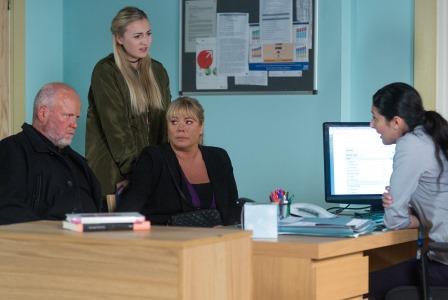EastEnders’ Phil Mitchell visited the 'Royal Free Hospital' tonight to find out if he is suitable for a liver transplant as part of a dramatic storyline on the BBC soap. 
The Royal Free London has recently been working with the BBC in relation to Phil’s possible liver transplant.
On last Monday’s episode Phil Mitchell, who has cirrhosis of the liver, had been referred to the Royal Free Hospital for an assessment and to see whether he can be put on the transplant waiting list. This week Phil has been seen coming to the Royal Free Hospital for assessments which will determine whether he is suitable for a liver transplant.
The BBC first came to the Royal Free for advice about alcohol misuse and liver transplantation at the start of the year.
Liz Shepherd, lead specialist nurse for substance misuse and liver transplantation, advised the EastEnders team on their scripts and offered general advice on alcohol and liver transplants so that the stories reflect real life as far as possible.
She explained how and when patients with alcohol-related liver disease might come to need a transplant and when they might be put on the transplant list.
The trust also worked with the producers to ensure their hospital sets and staff uniforms look as close to the real thing as possible – even down to the smallest details like name badges. We also provided advice on patient charts and paperwork.
Doug Thorburn, a transplant hepatologist and clinical director for liver transplantation at the Royal Free Hospital, said: “We hope this collaboration with EastEnders will allow people to understand how we help patients in need of a liver transplant. We provide a world class liver transplantation service with excellent outcomes - however, there aren’t enough donated organs for those who need them. We would like to encourage people to join the organ donor register and to talk about that decision with their families. That decision could help change or save someone’s life.”
You can join the organ donor register at www.organdonation.nhs.uk.
About Liz Shepherd
Liz Shepherd is one of just six specialist nurses for substance misuse and liver transplantation in the country.
Her role is to provide support to a patient with a history of substance misuse who now needs a liver transplant.
Before a patient can be placed on the transplant waiting list they must show that they have been abstinent for a set period and Liz and her colleagues must be confident that the patient is able to continue to be abstinent once they have the new liver.
Liz, who has been at the Royal Free Hospital for 13 years, said that there are a range of factors which can help the liver transplant team decide whether a patient is suitable for a transplant.
“The patient is first seen by a consultant hepatologist who will decide if a transplant might be appropriate for them", said Liz. “Then they will be referred to me or my colleague Andy Mowatt and we will assess them and provide support to the patient, to help them through the transplant process.
“We work with them to help them abstain. We help the patient understand what is being asked of them, help them develop coping strategies and give them counselling. We look at helping them change their behaviours and their thoughts so they can stay alcohol and drug-free before the transplant and after it. If the patient is suffering from depression then we help find them appropriate treatment for that.”
Liz’s work and input helps the multidisciplinary team decide whether the patient can go on to the transplant waiting list.
She said: “Our work helps to maintain the integrity of the liver transplant programme - if we are giving a liver to this patient, it means that someone else it is not going to receive that organ so we have to ensure that it is going to someone we believe can stay healthy.
“There are a range of tests we use to determine who should get a liver when it becomes available – for example who needs the transplant the most. It’s based on clinical need, there is no judgement of previous lifestyle choices.
Liz said that even though her work can be very challenging, it’s also hugely rewarding.
“It’s a really fascinating role,” she said. “I have the chance to help bring patients through a difficult period in their life, to enable them to get the care they need to survive and have a good quality of life.”
Ends
Images: Phil visits the 'Royal Free Hospital' for tests
 Translate
Translate
